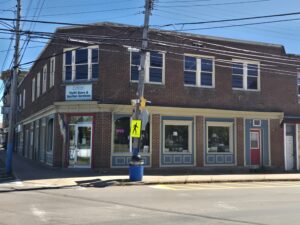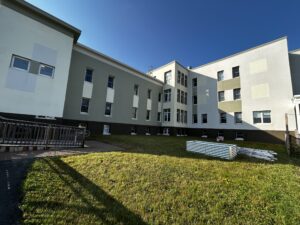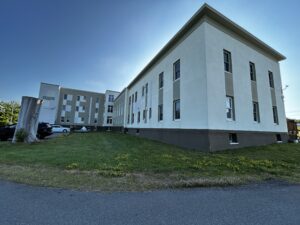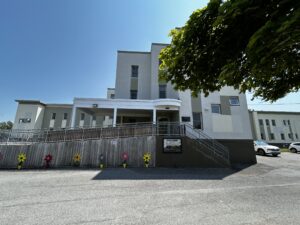Deep Retrofit Acceleration in Atlantic Canada
Projects Sponsor
Founded in 2020, the ReCover Initiative mobilized over $19 million to accelerate scalable, equitable deep retrofits across Atlantic Canada, a region with aging building stock, high energy burdens, and limited retrofit infrastructure. The project created 19+ green jobs, supported retrofit planning for over 1.5 million sq ft of building space, and engaged equity-deserving communities. With estimated annual carbon emissions reductions from planned retrofits exceeding 18,000 tonnes of CO₂e, ReCover is overcoming systemic barriers to retrofit implementation, building regional capacity, shifting market norms, and laying the foundation for scalable, equitable decarbonization.

The ReCover Initiative was created to respond to the urgent need for scalable, equitable deep retrofits in Atlantic Canada—a region with aging building stock, high energy burdens, and limited retrofit infrastructure with which to address these problems. The initiative aims to overcome systemic barriers to retrofit implementation, build local capacity, and center equity in climate action. To do this, the team knew they’d need to mobilize funding, create jobs, engage communities, and enable retrofit planning at scale. ReCover’s ambitious long-term vision is to enable deep retrofits for 60,000 buildings annually by 2031—transforming Canada’s retrofit economy and contributing meaningfully to national climate goals.
 Prior to launch, the ReCover team conducted regional market analysis, stakeholder interviews, and feasibility studies to understand barriers to deep retrofit adoption. This included starting an advisory committee of deep retrofit experts from across the country, and a local advisory committee to develop the newest iteration of the ReCover Initiative. The research found many things: lack of capacity in the deep retrofit construction and design industry, challenges for building owners in navigating deep retrofits and funding, and the continued exclusion of equity deserving communities from the solutions. Findings confirmed the need for a coordinated, equity-focused approach and informed the design of ReCover’s accelerator model.
Prior to launch, the ReCover team conducted regional market analysis, stakeholder interviews, and feasibility studies to understand barriers to deep retrofit adoption. This included starting an advisory committee of deep retrofit experts from across the country, and a local advisory committee to develop the newest iteration of the ReCover Initiative. The research found many things: lack of capacity in the deep retrofit construction and design industry, challenges for building owners in navigating deep retrofits and funding, and the continued exclusion of equity deserving communities from the solutions. Findings confirmed the need for a coordinated, equity-focused approach and informed the design of ReCover’s accelerator model.
Having completed regional research and stakeholder engagement, Recover began by convening a coalition of partners to co-develop successful funding applications to Natural Resources Canada’s Deep Retrofit Accelerator Initiative and the Greener Neighbourhoods Pilot Program. Once funding was secured, the team built the organization’s governance structure, hired staff, and launched the Building Transformation Program. Today, this program includes feasibility studies, retrofit planning, and community engagement events. To expand on these capabilities, a Deep Retrofit Roadmap is currently in development, including archetype analysis and retrofit strategies tailored to Atlantic Canada’s building stock.
 Building that kind of program from the ground up was, unsurprisingly, a challenge in its own right. Before the Recover Initiative could get down to business helping others retrofit aging properties, they first had to launch a brand-new organization with limited capital and little operational history. While core funding was provided by Natural Resources Canada, the organization lacked working capital and was too young to qualify for traditional financing. To overcome this, the team raised $2.2 million in bridge funding from philanthropic institutions and impact investors, including the first investment from Halifax’s Low Carbon Cities Canada fund. Another challenge was assembling a team and governance structure from scratch; this was addressed by recruiting a diverse board and hiring staff in phases, prioritizing equity and local capacity at every stage.
Building that kind of program from the ground up was, unsurprisingly, a challenge in its own right. Before the Recover Initiative could get down to business helping others retrofit aging properties, they first had to launch a brand-new organization with limited capital and little operational history. While core funding was provided by Natural Resources Canada, the organization lacked working capital and was too young to qualify for traditional financing. To overcome this, the team raised $2.2 million in bridge funding from philanthropic institutions and impact investors, including the first investment from Halifax’s Low Carbon Cities Canada fund. Another challenge was assembling a team and governance structure from scratch; this was addressed by recruiting a diverse board and hiring staff in phases, prioritizing equity and local capacity at every stage.
Key collaborators that made all this possible include the steering committee: Building to Zero Exchange, HCi3 (Halifax’s LC3 organization), and the Union of Nova Scotia Mi’kmaq. An additional equity-deserving strategic partner is One North End. Delivery partners include Habit Studio, RFS Energy, Navigate Energy, Nova Scotia Community College Energy Research Lab, and SEEFAR Analytics.

The project has mobilized over $19 million in funding, created over nineteen green jobs, and enabled retrofit planning for over one and a half million square feet of building space. Twelve buildings have formally entered the Building Transformation Program, with over a hundred additional prospects in the pipeline. Today, with estimated annual carbon emissions reductions from planned retrofits exceeding 18,000 tonnes CO₂e, the ReCover Initiative is laying a rock-solid foundation for scalable, equitable decarbonization, and that’s making waves.













